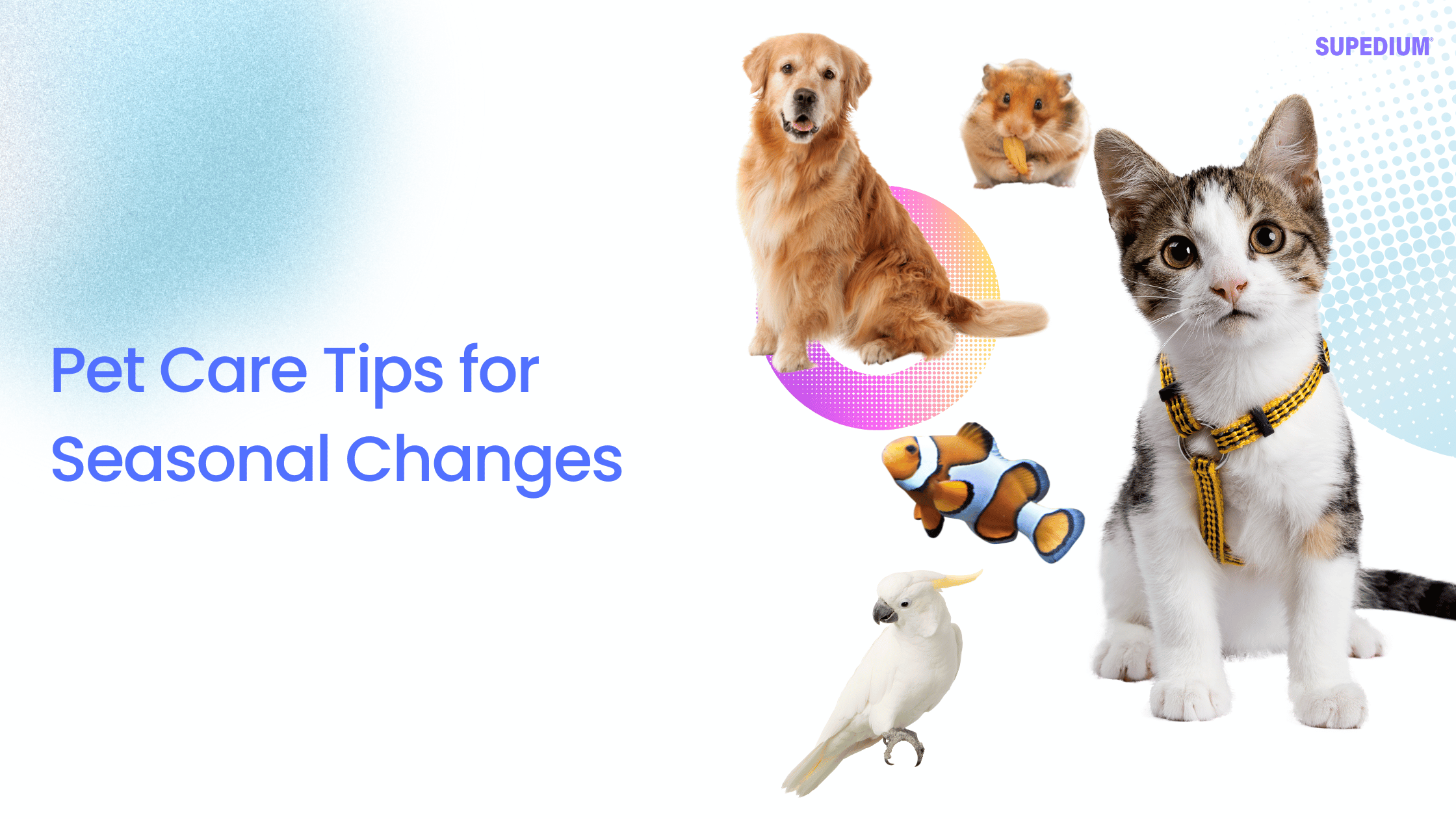Table of Contents
![]()
As the seasons change, so do the needs of your pets. Whether it’s the warmth of spring, the heat of summer, the crispness of fall, or the chill of winter, each season brings unique challenges and opportunities for pet care. By adjusting your pet care routine according to the seasonal shifts, you can ensure your furry friends stay happy, healthy, and comfortable year-round.
Spring: A Time for Renewal and Allergy Management
Spring is a time of rejuvenation, with longer days and warmer weather, but it also comes with some unique challenges for pets. As flowers bloom and trees begin to release pollen, your pet may encounter allergies, pests, and more.
Health & Hygiene
In spring, fleas, ticks, and other parasites become more active. This is the time to start or reinforce preventive measures like flea and tick treatments. Make sure to check your pet regularly for signs of fleas or ticks, especially if they spend time outdoors. Bathing your pet more frequently can also help remove dirt and allergens, reducing the risk of skin irritation.
Allergies
Just like humans, pets can suffer from seasonal allergies. Symptoms may include sneezing, itchy skin, red or watery eyes, and ear infections. To minimize exposure to allergens, try to keep your pet indoors during peak pollen hours (early mornings and late afternoons). After outdoor walks, wipe down your pet’s paws and coat to remove pollen, dust, or other allergens.
Outdoor Activities
Spring is an ideal time for outdoor exercise, but it’s important to take precautions. Pets are likely to shed more during this season, so regular grooming is essential to manage the fur. Additionally, ensure they are hydrated, and watch for signs of heat stress, especially during warmer spring days. You can adjust your walks or outdoor playtime to cooler parts of the day, such as early mornings or evenings.
Diet & Nutrition
With warmer weather, pets may be more active, and it’s a good idea to adjust their diet accordingly. Ensure they have access to fresh water at all times to stay hydrated. You might also want to consider feeding them seasonal foods, like fruits and vegetables, that can help keep them energized and healthy.
Summer: Managing Heat and Pests
Summer brings the sun, longer days, and plenty of outdoor fun. However, it also poses a range of health risks, especially due to heat and increased pest activity. Protecting your pet during this time is crucial.
Heat Management
The summer heat can be intense for pets, particularly for breeds with thicker coats or flat faces. Heatstroke and dehydration are serious risks during this season. Always provide access to fresh, cool water, and ensure your pet has a shaded area to rest in when they’re outside. Limit outdoor activities during the hottest parts of the day, opting for early morning or late evening walks instead.
To further prevent overheating, avoid leaving your pet in a parked car, even with the windows cracked. The temperature inside a car can rise quickly, putting your pet at risk.
Pest Control
Summer is prime time for fleas, ticks, mosquitoes, and other pests. Use flea and tick preventatives and heartworm medications as recommended by your veterinarian. Mosquitoes can transmit diseases like heartworm, so consider keeping your pet indoors during dawn and dusk when mosquitoes are most active. Additionally, inspect your pet regularly for signs of pests, especially after walks in wooded or grassy areas.
Skin & Coat Care
Pets with longer coats may benefit from a summer trim, but always consult a groomer to ensure the right approach for your breed. Regular brushing is essential to remove excess fur, which can trap heat. Also, be mindful of sunburns on light-colored pets or those with less fur, as they are more susceptible to UV rays. Apply pet-safe sunscreen to exposed areas, such as the nose and ears.
Travel & Safety
Summer is a popular time for vacations, and many pet owners like to take their pets along for the ride. If you’re traveling by car, make sure your pet is safely secured with a pet seatbelt or carrier. Never leave your pet in a vehicle unattended, and ensure you have plenty of water and breaks during long drives.
Fall: Adjusting to Cooler Weather and Holiday Precautions
As temperatures begin to drop and the days grow shorter, fall introduces new pet care considerations, including the change in climate and holiday hazards.
Adjusting to Cooler Weather
In fall, it’s important to help your pet transition from the warmth of summer to the cooler days ahead. If your pet spends a lot of time outdoors, you might need to add a cozy jacket or sweater for additional warmth, especially for small breeds or those with thin coats. Likewise, ensure that their bedding or sleeping area is kept warm and draft-free.
Health Risks
Fall brings about seasonal allergies, particularly from falling leaves, mold, and pollen. If your pet is prone to allergies, monitor for symptoms like itchy skin, sneezing, or watery eyes. Regularly clean your pet’s paws and coat to remove allergens, and keep windows closed on high pollen days.
Grooming & Coat Care
Fall is shedding season for many pets as they prepare for winter. Regular brushing can help manage this and prevent mats from forming in their coats. This is also a good time to have your pet’s coat trimmed or groomed for comfort.
Indoor Comfort
As the temperatures drop, create a cozy indoor space for your pet to relax in. Adjust your home’s heating to ensure your pet’s comfort and prevent cold drafts. Many pets prefer heated bedding or pads to stay warm during the night.
Holiday Precautions
With holidays like Halloween around the corner, it’s essential to keep your pet safe from hazards. Watch out for decorations and candy that can be harmful to pets. Chocolate, certain candies, and xylitol (found in sugar-free products) are toxic to animals. Keep decorations like pumpkins and fake cobwebs out of reach, and ensure your pet isn’t stressed by constant doorbell ringing.
Winter: Keeping Warm and Safe
Winter presents some of the harshest conditions for pets, but with the right care, they can thrive in cold weather.
Cold Weather Safety
During the winter, it’s crucial to protect your pet from the cold. Short-haired dogs or those with sensitive skin may need winter coats when venturing outside. Limit outdoor time in extreme cold and ice, as exposure can lead to frostbite or hypothermia. When walking your pet, be mindful of salt and chemicals used to melt snow, as they can irritate paws. After walks, wipe their paws to remove any residue.
Exercise & Play
Cold weather doesn’t mean your pet should stop exercising. Adjust their outdoor routine by opting for shorter, more frequent walks. If it’s too cold to go outside, provide indoor playtime or interactive toys to keep them mentally and physically stimulated.
Nutrition
In the winter, pets may burn more calories to stay warm, so you may need to adjust their food portions to accommodate increased energy needs. Make sure their diet is well-balanced and rich in nutrients. Warm, hearty meals or treats (e.g., stews) can also help keep your pet satisfied.
Preventing Illness
Keep your pet indoors during extreme cold spells to avoid illness or injury from exposure. Additionally, schedule a vet visit for a winter check-up, ensuring they are up to date on vaccinations and preventive care. It’s also a good idea to have a vet review your pet’s joint health as cold weather can exacerbate arthritis.
Hydration
Just because it’s cold doesn’t mean hydration isn’t important. Ensure your pet always has access to fresh water, and monitor outdoor bowls to prevent them from freezing. This is particularly important for pets that spend time outside in the winter months.
Year-Round Pet Care Tips
While the seasons change, some aspects of pet care remain consistent throughout the year. Here are some tips to ensure your pet stays healthy no matter the season:
Routine Vet Check-ups
Regular veterinary visits are essential to monitor your pet’s health, stay up to date on vaccinations, and address any concerns. This is particularly important if you’re adjusting your pet’s diet or health care routine based on seasonal changes.
Parasite Prevention
Fleas, ticks, and worms are a year-round concern, and it’s important to stay on top of parasite prevention treatments. Consult your veterinarian to develop a year-round strategy for keeping your pet safe from pests.
Hydration & Nutrition
Proper hydration and a balanced diet are vital for your pet’s overall health. Ensure they have access to fresh water at all times, especially during seasonal transitions when their activity levels or food needs may change.
Comfort & Safety
Finally, remember to always pet-proof your home, especially during times of heightened activity or seasonal changes. Ensure that your pet has safe, comfortable spaces to rest, and that hazardous items like chemicals, food scraps, or decorations are out of reach.
Conclusion
As the seasons change, so too do the needs of your pet. By adjusting your pet care routine to accommodate the unique challenges and opportunities each season presents, you can help ensure that your pet stays healthy, happy, and comfortable throughout the year. Keep a close eye on your pet’s behavior, health, and environment, and don’t hesitate to consult with a veterinarian to address any concerns. With the right care and attention, your pet will enjoy all the seasons with you by their side.
Share This





Be the first to comment